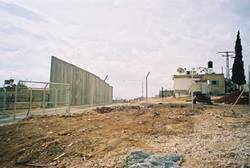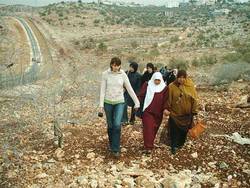Menu

Protests against the Wall – Israel, November 2003
From a visitor's journal:
Coordinating demonstrations among Israelis, Palestinians in the West Bank, Palestinians living in Israel and internationals is not an easy task. All obvious conflict tensions aside, finding a day when all three groups can protest together, or at the same time, is just difficult. The Palestinians do not work on Fridays, the Israelis on Saturdays, and the Christians on Sundays, so there are preferences with every group according to their work week and religious practices.
In Israel, it was decided that the protests were to begin on Saturday, a day before the international protests, so that as many Israelis as possible could attend. Before I left for the protest meeting point, I ate a full breakfast and drank lots of water as it would be disrespectful to eat and drink anything during daylight hours in front of Muslims fasting for Ramadan.
Saturday, 8 November 2003: Protest against the Wall – East Jerusalem
More protesters showed up than expected and it looked like we were about 1000 people strong. The buses arrived to take us to Abu Dis in East Jerusalem, and once we boarded, we were briefed on what protest actions would be taking place and on safety tips in dealing with soldiers. Once we arrived in Abu Dis, we quickly left the buses, grabbed onions to use over our eyes in case the police used tear gas on us, and headed towards the 8 meter high slabs of concrete which were being stored along the road.
As we faced the huge monoliths, spray cans were quickly passed out and words of peace and calls for an end to the occupation and the Wall were sprayed enthusiastically onto every reachable spot of concrete. Once we were finished, the giant slabs of wall had become a colorful mosaic of Hebrew, Arabic, English, French, Spanish, and Japanese words urging for reason, humanity, and peace to prevail.
The demonstration moved on to Sawahreh, where the Wall will cut through the town and separate it from it's cemetery. Once the Wall is erected, the villagers will no longer be able to bury their dead with their families. The end of the protest was marked with the call to continue the struggle against the Wall, to end its construction, and to compensate the Palestinians for their losses. We were all relieved that the protest remained peaceful and that the military did not decide to barracade the towns, making them a "closed military zone", which had prevented demonstrations in the past.
Sunday, Nov. 9th International Day of Protest against the Wall – The West Bank
Early on Sunday morning I hitched a ride with one of the staff of the International Women's Peace Service, to the West Bank town of Haris, about 20 kilometers west of the city of Nablus. We had to transfer taxis three times and made it to the house in the record time of an hour and a half. While hiking through the hills to avoid a checkpoint, a soldier ran up to us and between gasps of breath informed us that we had to turn around and enter Haris through the checkpoint. The IWPSers' unwavering response of, "Yeah, but I walked this way yesterday!" seemed to confuse him and he mumbled something about the checkpoint, wished us a good day and let us continue on our way.
After arriving at the IWPS house and greeting the five other international volunteers, we quickly gathered our protest signs and drove to the town of Mas-ha to wait at the "Baladia" or town hall, for the Palestinian women protesters. This was a significant day for the women of Haris and Mas-ha. They were going to have their first ever women-organized demonstration. The goal of the demonstration was to walk to a house that is sandwiched between an Israeli settlement and the Wall. The house belongs to a Palestinian woman and because the Wall is right in front of her doorstep, the Israeli government fully expected her to leave and abandon her house. But Palestinian women are strong and resolute and her family stayed put. To make her life more difficult, the Israeli government buillt a concrete portion of the wall right in front of her house (the Wall in this area consists mainly of electrified, wire fences) which blocks her view of Mas-ha and her community.
As soon as the Palestinian women arrived, it was clear who the voice of their movement was. A strong, energetic woman named Selwa* stood in the center of the group and started coordinating the route our demonstration would take to the checkpoint. Suddenly, several Palestinian men interrupted our small gathering and started dictating how we were going to demonstrate. They took our signs away and then a long series of negotiations between the Palestinian women and men were undertaken to figure out how best to proceed with the demonstration.
With the men leading the way, our group, now twenty strong, walked to Mas-ha to pick up more women protesters. There were about 40 of us as we began to walk hand in hand alongside the trenches and razor-wire to the checkpoint. I felt exhilarated when a Palestinian woman unexpectantly took my hand in hers. We walked together and she spoke to me in broken English about her life in the West Bank.
About ten meters before the checkpoint, the men called on us to stop and, surprisingly, gave us our posters back. Without missing a beat, Selwa called for the men to move back and let the women lead the protest. After all it was a women's demonstration! Amazingly, the men agreed and with immense pride and relief we walked forward to the checkpoint where four Israeli soldiers had been waiting for us.
Dealing with the soldiers went fairly quickly as they were only going to prohibit us from passing the checkpoint into the Israeli settlement, which was not our intent. At the house we were greeted by 5-6 national and international journalists, who filmed and took pictures as we held hands and the Palestinians sang songs of protest. In the background, the concrete Wall towered over us, but we felt relieved and happy that we had even managed the protest. Israeli security and soldiers drove by every five minutes to assure us of their presence, but we turned to face each other because our presence and solidarity was what was important. One could say that it was only a small protest that made little difference, but it was significant for Selwa and the women of Haris and Mas-ha as it was their first public attempt at voicing their opposition, fears, and anger against an increasingly brutal life under the Occupation. And as they considered this protest a success, I am sure it will not be the last.
(addition: On December 26th, 2003, Palestinians, Israelis, and internationals demonstrated at the passageway through the Wall leading into Mas-ha. As the Israeli activists attempted to tear down parts of the metal fence, Israeli soldiers shot first in the air and then opened fire on the activists injuring one young man in the knee.)
*Name has been changed
Our correspondent reported from the region.



